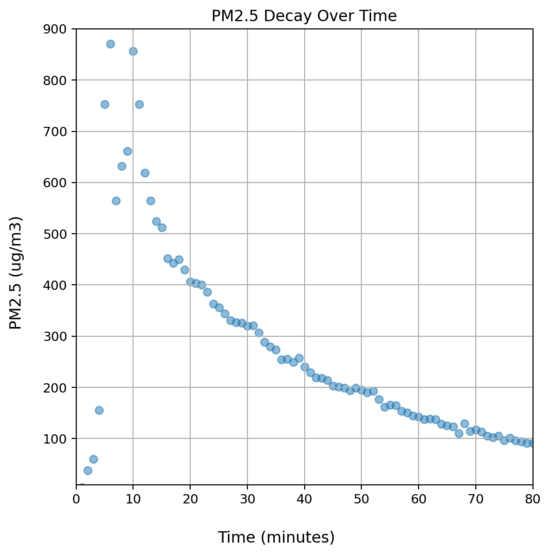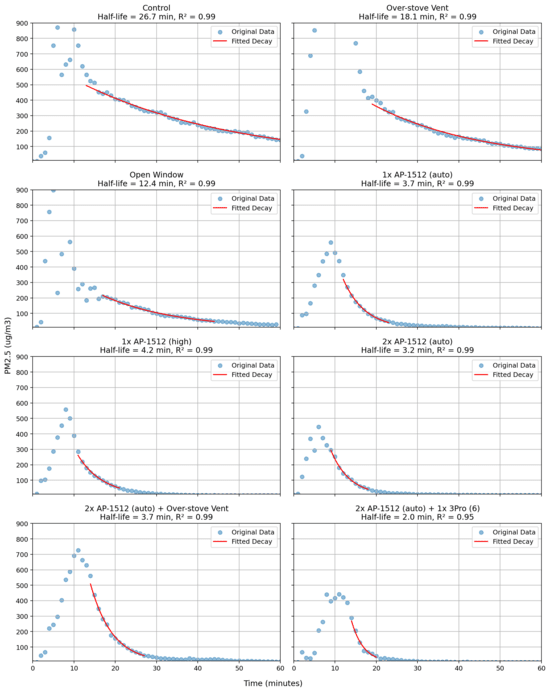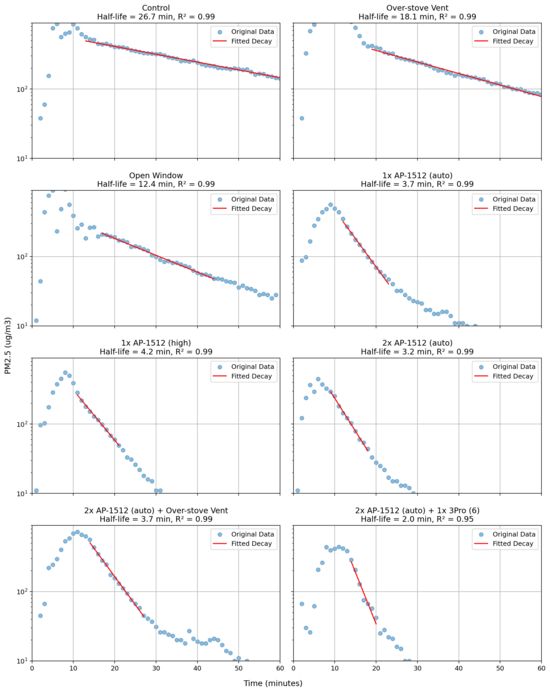Kitchen Air Purifier Comparison
post by jefftk (jkaufman) · 2025-01-22T03:20:03.224Z · LW · GW · 2 commentsContents
2 comments
I make breakfast for the kids most mornings, and one thing I didn't realize before I started playing with an air quality monitor was how much this puts smoke in the air. It's not like cooking Naan or searing meat where if I don't put a fan in the window the smoke alarm will go off, but apparently it's quite a lot of particles:
While I initially got interested in air quality from an infection reduction perspective, I'd also prefer not to be breathing smoke. How much does an air purifier help? What about opening a window? Running the little vent fan over the stove that doesn't seem to do anything?
I decided to run some tests. In each case I'd set up my M2000 in the kitchen and start cooking breakfast for the kids. For consistency, I only did this on days when I was making the most common option: crepes. While it would have been best to try each condition a few times to learn what sort of variability there was, I wasn't that patient.
The conditions I tested were:
Control: no attempt made to reduce smoke.
Over-stove Vent: turning on the vent fan on our over-stove microwave. It doesn't vent outside, and it doesn't seem to have any sort of fine filter that could catch little particles, but possibly it does something?
Open Window: opening a window. I didn't put a fan in the window or anything. This is the one I'd expect to have the most variability in practice since there should be a big difference between a more windy and less windy day. I don't remember how windy it was when I tested this.
1x AP-1512 (auto): a Coway AP-1512 purifier on the "auto" setting. It runs on "low" most of the time, and then ramps up to "medium" and then "high" when it detects particles. For a long time we had one of these on top of our fridge.
1x AP-1512 (high): same, but set full-time to "high". This isn't something we'd normally do because it was too noisy, but I was curious how much of an effect it had. I ended up analyzing the data in a way that wouldn't capture this benefit, though.
2x AP-1512 (auto): two of the AP-1512 purifiers, both on "auto". Until recently this is what we had in our kitchen.
2x AP-1512 (auto) + Over-stove Vent: the same, but also turning on the over-stove vent.
2x AP-1512 (auto) + 1x 3Pro (6): instead of the vent, turning on the Airfanta 3Pro I mounted in the kitchen. I ran the 3Pro on its highest setting, representing what we usually do: when we hear the AP-1512 spin up to high, we bump the 3Pro from it's normal quiet 2/6 up to 6/6. This is our current kitchen setup.
While I liked the idea of cooking the same breakfast each time, it didn't make a consistent amount of smoke. Some days I let the pan get a little hotter, sometimes I would forget a crepe in the pan, etc. What should be comparable, though, is the rate at which smoke particles decreased. This should be a process of exponential decay: every minute a consistent fraction of the particles should make their way out the doors into other parts of the house, settle out of the air, be caught in a filter, etc.
I wrote some code, with a significant LLM speedup, to plot the decay I saw in each case. For each example I started estimating after the peak when it seemed be entering its exponential decay phase, and then stopped counting when it fell below 50ug/m3:
Since this is exponential decay, however, a logarithmic y-axis better allows us to judge how good the model is:
Conclusions:
The over-stove vent was essentially useless. I think the benefit we saw was probably due to slightly accelerating the transfer of air between rooms, but since there are also people in the other rooms this isn't a real benefit.
Opening the window helped much less than I expected. Before running this I thought that the window was great, except for the amount of heat you lose to (or in the summer receive from) the environment. But at least without putting the fan in the window it only cuts the time about in half,.
Adding a single air purifier is a big improvement. Looking at these charts, I probably wouldn't bother getting more than one: a half life of four minutes is pretty good.
The second air purifier didn't help much. I don't know how much of this is noise from test to test, and how much is that I put them right next to each other (on top of the fridge) instead of the more ideal situation of opposite sides of the room.
Adding the 3Pro helped a lot, probably because it's almost twice as powerful as the AP-1512.
One benefit I'm not capturing here is what happens during the time when you're producing smoke: can your purifiers keep up with it, or are they playing catch-up? This isn't really something I was set up to measure, since I couldn't generate a consistent initial burst of smoke, but eyeballing the results they do look to be in the expected direction.
I did most of this work when Lily was asking for crepes all the time, but aside from what I'm guessing was a one-off this morning that's not what she wants these days. If at some point she changes her mind, I'd like to test:
A fan in the window pointing out.
That, plus opening a kitchen window.
That, but a dining room window instead.
The 3Pro alone.
The main scenarios above, again, to measure consistency.
Comment via: facebook, mastodon, bluesky
2 comments
Comments sorted by top scores.
comment by Dave Orr (dave-orr) · 2025-01-22T03:57:27.612Z · LW(p) · GW(p)
This is great data! I'd been wondering about this myself.
Where were you measuring air quality? How far from the stove? Same place every time?
Replies from: jkaufman↑ comment by jefftk (jkaufman) · 2025-01-22T12:12:22.443Z · LW(p) · GW(p)
Other side of the room, about ten feet from the stove. Same place each time, yes.


